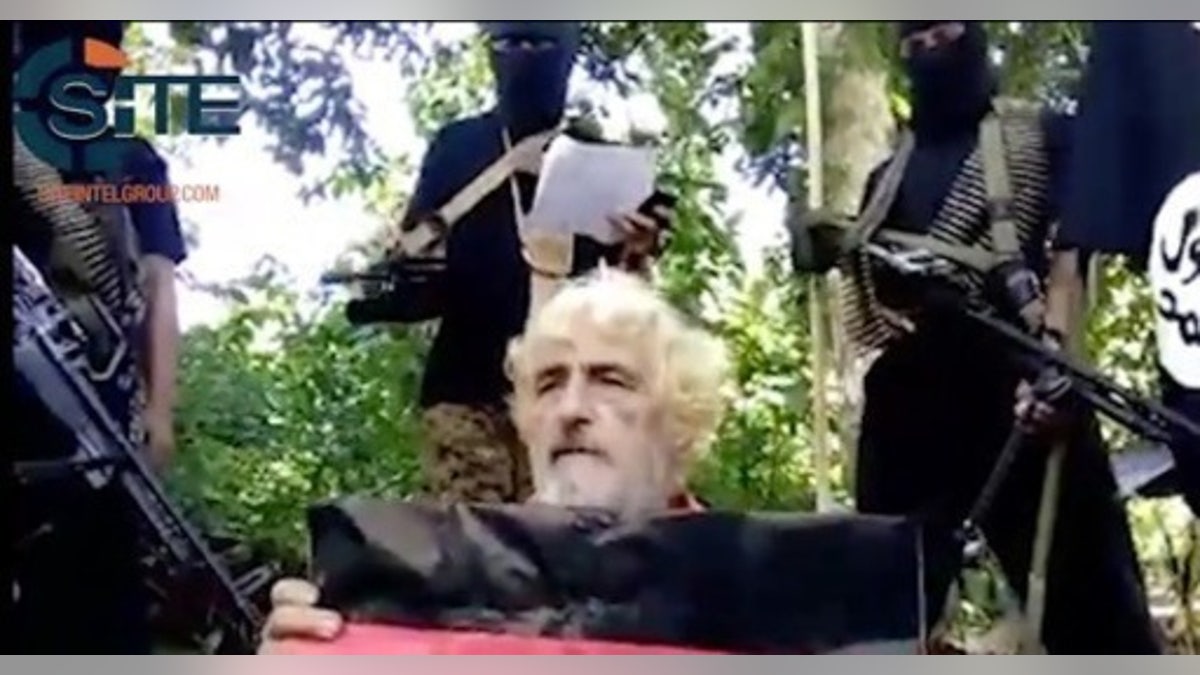
German hostage Jurgen Gustav Kantner kneels before his Islamic militant captors at an undisclosed location. (SITE Intel Group via AP)
A German sailor who had survived two months as a hostage of Somali pirates nearly a decade ago was beheaded in the Philippines by Islamic terrorists, a short video released Monday showed, after a deadline to pay the man’s ransom passed.
Jurgen Gustav Kantner's beheading was the first murder of a hostage by the terror group Abu Sayyaf since two Canadians were killed in June. Officials said they had sketchy information Kantner was killed because he was sick, Reuters reported.
EGYPTIAN CHRISTIANS FLEE SINAI FOLLOWING ISIS THREAT
The brief video circulated Monday by the SITE Intelligence Group, which monitors jihadi websites, showed Kantner sitting in a grassy clearing and saying "Now he kill me" shortly before a masked militant beheaded him with a curved knife.
A few gunmen muttered "Allahu Akbar” in the video that lasted 1 minute and 43 seconds.
ISIS MILITANTS KILL 11 IN MOSQUE AMBUSH, AFGHAN OFFICIAL SAYS
The militants threatened to kill him midafternoon Sunday if a ransom of about $605,000 was not paid, Philippines officials said. Abu Sayyaf, a terror group linked to the Islamic State, has made millions of dollars via ransom demands and still holds 26 hostages, Reuters reported.
Abu Sayyaf claimed in November that its gunmen had kidnapped Kantner and killed a woman sailing with him off neighboring Malaysia's Sabah state. Villagers later found a woman dead on a yacht with the German flag off Laparan Island in Sulu province in the southern Philippines, the military said.
Kantner and his partner, Sabine Merz, were taken hostage by Somali pirates in 2008 and later freed, officials said.
The Philippine military said it would not confirm Kantner's death unless it sees the captive's remains or other compelling evidence. Military spokesman Brig. Gen. Restituto Padilla said he "will not dignify that video by watching it."
Padilla added, "They can shout and claim whatever they want, but we will not rely on this," saying an ongoing offensive against Abu Sayyaf and attempts to rescue foreign and local hostages held by the militants would continue.
The military had received information about infighting within Abu Sayyaf, with some militants preferring to wait for a huge ransom and a more hard-line commander demanding that the German be killed as the militants had announced, Padilla said, without elaborating.
In Germany, Foreign Ministry spokesman Martin Schaefer said German experts were evaluating the video to determine whether it was authentic, but that if it is, it's "deeply shocking."
"It makes you question what can lead people to commit such a barbaric crime, but, at the moment, I'm not in a position to say whether the video's authentic," he said.
The Associated Press contributed to this report.






































